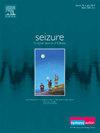预测发展为癫痫或遗传性癫痫伴热性癫痫发作(GEFS+)的儿童表现为热性癫痫发作:一项回顾性多中心纵向研究。
IF 2.8
3区 医学
Q2 CLINICAL NEUROLOGY
引用次数: 0
摘要
目的:确定从热性癫痫发作到癫痫或遗传性癫痫伴热性癫痫发作(GEFS+)进展的可能预测因素,并评估意大利临床环境中热性癫痫发作的管理。方法:从四家不同的医院招募了231名需要治疗或随访的复杂热性惊厥、热性癫痫持续状态或单纯热性惊厥反复发作的儿童。在基线评估和随访期间,收集了有关每个儿童的发热性癫痫发作(次数、持续时间、触发因素、临床特征)、精神运动发展、可能的神经精神合并症、任何神经精神疾病家族史以及脑电图评估(EEG)、诊断测试和处方治疗结果的数据。采用Mann-Whitney和Fisher检验、单变量和多变量logistic模型对数据进行分析。结果:癫痫家族史、较高的绝对发作次数、发热性癫痫发作的年龄以及发热性癫痫发作的存在被发现是癫痫或GEFS+风险增加的相关因素。相反,起病时脑电图正常,24小时内单纯发热性惊厥或复杂发热性惊厥次数增加则与较低的风险相关。结论:本研究提供了以前未报道的与热性惊厥患者癫痫或GEFS+预测相关的证据,这可能有助于识别新的预后因素。它还强调了对当前关于热性惊厥的国家和国际指南的关注。本文章由计算机程序翻译,如有差异,请以英文原文为准。
Prediction of evolution to epilepsy or genetic epilepsy with febrile seizures plus (GEFS+) in children presenting with febrile seizures: a retrospective multicenter longitudinal study
Objectives
To identify possible predictors of progression from febrile seizures to epilepsy or genetic epilepsy with febrile seizures plus (GEFS+), and to evaluate the management of febrile seizures in Italian clinical settings.
Methods
231 children with complex febrile seizures, febrile status epilepticus, or recurrent episodes of simple febrile seizures requiring therapy or follow-up, were recruited from four different hospitals. At the baseline evaluation and during follow-up, data were collected regarding each child’s febrile seizures (number, duration, triggers, clinical characteristics), psychomotor development, possible neuropsychiatric comorbidities, any family history of neuropsychiatric disorders, as well as findings of electroencephalographic evaluation (EEG), diagnostic tests, and prescribed treatments. The data were analyzed using Mann-Whitney and Fisher tests, and univariate and multivariate logistic models.
Results
A family history of epilepsy, a higher absolute number of episodes, an older age at onset of febrile seizures, and the presence of afebrile seizures were found to be factors associated with an increased risk of developing epilepsy or GEFS+. Conversely, a normal EEG at onset and an increase in the number of simple febrile seizures or of complex febrile seizures occurring within the first 24 h were associated with a lower risk.
Conclusions
This study provides previously unreported evidence relevant to the prediction of epilepsy or GEFS+ in patients with febrile seizures, which may facilitate the identification of new prognostic factors. It also highlights concerns regarding the current national and international guidelines on febrile seizures.
求助全文
通过发布文献求助,成功后即可免费获取论文全文。
去求助
来源期刊

Seizure-European Journal of Epilepsy
医学-临床神经学
CiteScore
5.60
自引率
6.70%
发文量
231
审稿时长
34 days
期刊介绍:
Seizure - European Journal of Epilepsy is an international journal owned by Epilepsy Action (the largest member led epilepsy organisation in the UK). It provides a forum for papers on all topics related to epilepsy and seizure disorders.
 求助内容:
求助内容: 应助结果提醒方式:
应助结果提醒方式:


